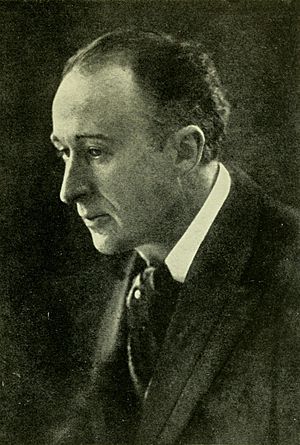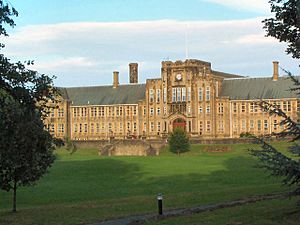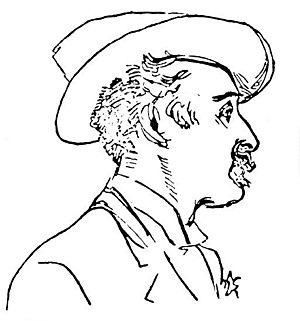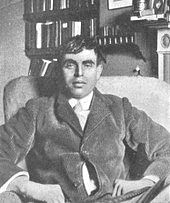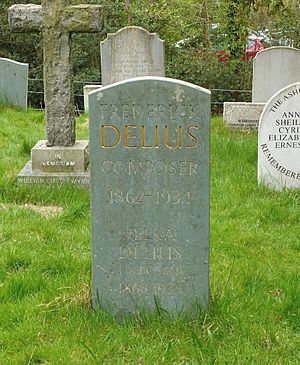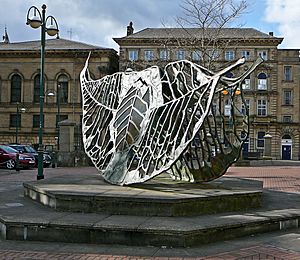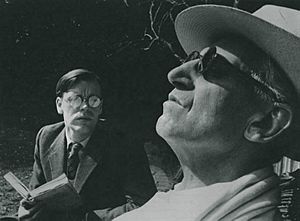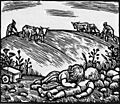Frederick Delius facts for kids
Frederick Theodore Albert Delius CH (born January 29, 1862 – died June 10, 1934) was an English composer. He was first known as Fritz Delius.
Contents
The Life of Frederick Delius
His Early Life and Musical Beginnings
Frederick Delius was born in Bradford, a city in Yorkshire, England. He was one of 14 children, with three older brothers and ten sisters.
His family loved music. Famous musicians like Joseph Joachim and Carlo Alfredo Piatti would visit their home and play music for them. Even though his parents were German, young Fritz loved the music of Chopin and Grieg. He liked their style more than the music of Mozart and Beethoven. This preference stayed with him his whole life.
Delius first learned to play the violin from Rudolph Bauerkeller. He later had more lessons from George Haddock.
Delius became good enough at the violin to teach it later on. But his favorite musical activity was playing the piano and making up his own tunes. A waltz by Chopin gave him his first amazing experience with music.
From 1874 to 1878, Delius went to Bradford Grammar School. Then, from 1878 to 1880, he attended the International College near London. He wasn't the quickest or most hardworking student. However, the college was close to the city, so Delius could go to concerts and operas.
Delius's father, Julius, wanted his son to work in the family wool business. For three years, he tried to make Delius join. Delius's first job was in Stroud, where he did reasonably well. But when he was sent to Chemnitz, he spent his time visiting music centers in Germany and studying music with Hans Sitt.
His father then sent him to Sweden. Again, Delius put his love for art before business. He was inspired by Norwegian writers Henrik Ibsen and Gunnar Heiberg. Next, Delius was sent to France for the business. But he often left work to visit the French Riviera. After this, Julius Delius realized his son would not succeed in the family business. Still, he didn't want Delius to be a musician. Instead, he sent him to Florida to manage an orange plantation.
While in Florida, Delius had his first music published. It was a piano piece called Zum Carnival. In late 1885, he left his plantation and moved to Danville, Virginia. From then on, he focused only on music. He advertised lessons in piano, violin, music theory, and composition. He also taught French and German. Danville had a lively music scene, and some of his early works were performed there.
Studying Music in Europe
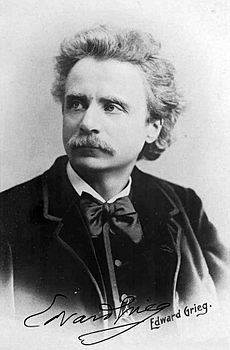
In 1886, Delius's father finally agreed to let him study music formally. Delius returned to Europe and enrolled at the conservatory in Leipzig, Germany.
After leaving Leipzig in 1888, Delius moved to Paris. His uncle, Theodore, helped him with money and social life. Delius didn't mix much with French musicians. Because of this, his music never became widely known in France.
Delius wrote a lot of music during his years in Paris. His symphonic poem Paa Vidderne was performed in Christiania in 1891. Gunnar Heiberg asked Delius to write music for his play Folkeraadet in 1897. Delius's second opera, The Magic Fountain, was accepted for a show in Prague. However, the plan fell through. Other works from this time include the overture Over the Hills and Far Away (1895–97) and orchestral variations, Appalachia: Variations on an Old Slave Song (1896).
First Big Successes
In 1897, Delius met Jelka Rosen, a German artist who later became his wife. She was a painter and admired Delius's music. They both loved the ideas of philosopher Friedrich Nietzsche and the music of Grieg. Jelka bought a house in Grez-sur-Loing, a village near Paris. Delius visited her there and soon moved in with her.
They married in 1903. Delius lived in Grez for the rest of his life, except for a short time during the First World War.
In the same year, Delius started working with German conductors who supported his music. These included Hans Haym, Fritz Cassirer, Alfred Hertz, and Julius Buths.
Many of Delius's new works were first performed by these German conductors. In 1904, Cassirer premiered Koanga. The Piano Concerto was also performed in Elberfeld that year. Appalachia (choral orchestral variations inspired by Florida) followed in 1905. Sea Drift (a cantata with words from a poem by Walt Whitman) was first performed in 1906. His opera A Village Romeo and Juliet premiered in Berlin in 1907. Delius was very popular in Germany until the First World War. In 1910, his rhapsody Brigg Fair was played by 36 different German orchestras.
Growing Fame
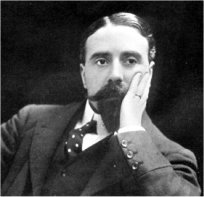
By 1907, Delius was very successful because his music was played in many German cities. As conductor Thomas Beecham said, Delius was "floating safely on a wave of prosperity."
In the early 1900s, Delius wrote some of his most famous pieces. These include Brigg Fair (1907), In a Summer Garden (1908), Summer Night on the River (1911), and On Hearing the First Cuckoo in Spring (1912).
War and Later Years
During the First World War, Delius and Jelka moved to southern England to avoid the fighting. Delius kept composing there.
One of Delius's important works from this time was his Requiem. He dedicated it to "all young Artists fallen in the war."
After the war, Delius and Jelka returned to Grez. Delius's health got much worse. He sought treatment across Europe. By 1922, he needed two sticks to walk. By 1928, he had lost his ability to move and see. He was no longer as wealthy as before the war. His medical care was expensive, and his blindness stopped him from composing. Also, he earned less money because his music wasn't performed as much in Europe. Thomas Beecham secretly helped him financially. Another composer, H. Balfour Gardiner, bought their house in Grez and let Delius and Jelka live there for free.
His Final Years
A young English admirer named Eric Fenby heard that Delius was trying to compose by telling Jelka what to write. Fenby offered to help for free. For five years, starting in 1928, Fenby worked with Delius. He wrote down Delius's new music as Delius dictated it. He also helped Delius revise older works.
Together, they created several pieces. These include Cynara, A Late Lark, A Song of Summer, a third violin sonata, and Idyll (1932). Fenby believed their greatest work together was The Songs of Farewell, which used poems by Whitman for chorus and orchestra. Delius dedicated this to Jelka. Other works from this time include a piece for cello and orchestra called Caprice and Elegy. Delius also wrote a short orchestral piece, Fantastic Dance, which he dedicated to Fenby.
Fenby later wrote a book about working with Delius. He shared that Delius loved cricket. They followed the 1930 Test series between England and Australia with great interest. In 1932, Delius was given the Freedom of the City of Bradford, an honor from his hometown.
Delius died in Grez on June 10, 1934, at age 72. He wanted to be buried in his garden, but French rules didn't allow it. His second wish was to be buried "in some country churchyard in the south of England, where people could place wild flowers." Jelka was too ill to travel then, so Delius was temporarily buried in the local cemetery in Grez.
In May 1935, Jelka felt strong enough to travel to England for a reburial. She chose St Peter's church in Limpsfield, Surrey. She sailed to England for the service but became ill. She missed the reburial on May 26. The ceremony happened at midnight. Jelka died two days later, on May 28. She was buried in the same grave as Delius.
Memorials and Legacy
Before he died, Delius made a change to his will. He wanted the money from his music performances to support concerts for young composers each year. Delius died before this could be made legal. Eric Fenby said that Thomas Beecham then convinced Jelka to use the money to edit and record Delius's main works instead.
After Jelka's death in 1935, the Delius Trust was created to manage this task. The Trust worked mostly under Beecham's guidance. Today, the Trust also promotes the music of other composers who lived at the same time as Delius. It helps fund a prize for young composers.
Herbert Stothart arranged Delius's music, especially Appalachia, for the 1946 film The Yearling.
In America, a small memorial to Delius stands in Solano Grove, Florida. The Delius Association of Florida holds an annual festival in Jacksonville to celebrate the composer's birthday. Jacksonville University gives an annual Delius Composition Prize for music. In February 2012, Delius was one of ten famous Britons honored by the Royal Mail with a special stamp.
Images for kids
-
The Fisk Jubilee Singers, shown during a European tour in the 1870s
-
Woodcut illustration (1919) of the young lovers from Gottfried Keller's original story, which became Delius's opera A Village Romeo and Juliet
See also
 In Spanish: Frederick Delius para niños
In Spanish: Frederick Delius para niños


